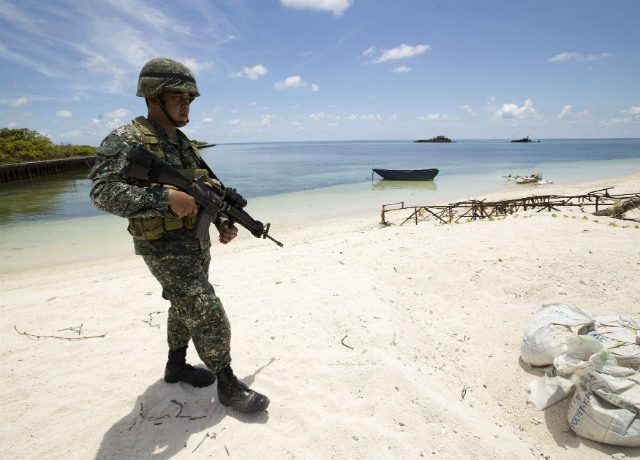SUMMARY
This is AI generated summarization, which may have errors. For context, always refer to the full article.

MANILA, Philippines – The Philippines’ dispute with China over the West Philippine Sea (South China Sea) has pulled down the Southeast Asian country’s ranking in the latest Global Peace Index.
The Philippines has dropped to 141 this year from 134 in 2014.
For the low ranking, the Global Peace Index cited not only the South China Sea dispute but also internal conflicts in the Philippines.
“The South China Sea remains a potential area for conflict, with countries involved in the dispute (China, Vietnam and the Philippines) all showing a worsening of their scores in the 2015 index. Although the likelihood of further military skirmishes in the disputed waters is high, a large-scale military engagement remains unlikely,” said the index released by the Institute for Economics and Peace on Wednesday, June 17.
“The Philippines suffered from an escalation of internal conflicts between the government and rebel groups occurring late in the measurement period,” the index added.
In the Asia-Pacific region, the Philippines is now second to the last in the Global Peace Index, besting only North Korea, which ranks 153rd.
In an interview over state-run dzRB on Saturday, June 20, Philippine Communications Secretary Herminio Coloma Jr acknowledged the Philippines’ lower ranking in the Global Peace Index.
Reacting to the peace index, Coloma stressed that the Philippine government “has always advocated a peaceful and rules-based approach in resolving the issues concerning the West Philippine Sea.”
He added that the Philippines is pursuing a historic arbitration case against China “as the vehicle” to peacefully resolve the sea dispute.
Palace pushes for Bangsamoro law
“In fact, the international community expressed solidarity in this approach chosen by the Philippines. We are awaiting the findings of the Permanent Court of Arbitration (PCA) on this matter,” Coloma said, as the Philippines prepares for oral hearings at the PCA in The Hague, The Netherlands, in July.
He also said one of the government’s top priorities is “achieving long-term peace, stability, and progress” in the southern Philippine island group of Mindanao, which has suffered from 4-decade armed conflict fueled by a secession bid.
He said the government is also pushing for the passage of the proposed Bangsamoro Basic Law (BBL), which aims to create a more empowered Bangsamoro region in Mindanao.
Coloma said: “Although debates about the BBL went beyond the last session of Congress, we see this as an opportunity to harmonize the differing viewpoints. Government will also continue to intensify efforts in pursuing heightened citizen awareness that is essential in engaging their active participation in the peace process.”
Part of the peace process was the historic turnover on Tuesday, June 16, of a first batch of firearms of the Muslim rebel group Moro Islamic Liberation Front (MILF). Philippine President Benigno Aquino III witnessed this turnover.
The Global Peace Index comes as independent pollster Social Weather Stations said 8 out of 10 Filipinos fear that the South China Sea dispute could lead to a full-blown conflict with China.
At the same time, government critics have threatened to derail the BBL especially after a botched police operation in Mamasapano, Maguindanao, triggered a bloodbath blamed on the MILF and left 67 Filipinos dead. – with reports from Agence France-Presse/Rappler.com
Add a comment
How does this make you feel?
There are no comments yet. Add your comment to start the conversation.